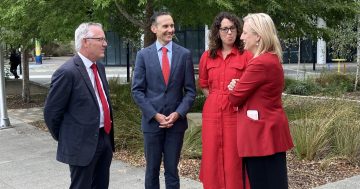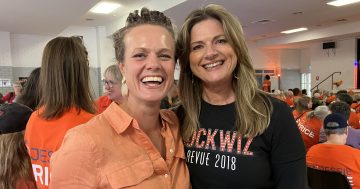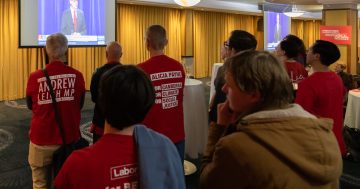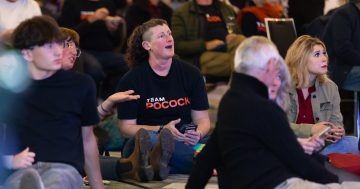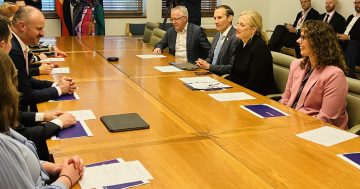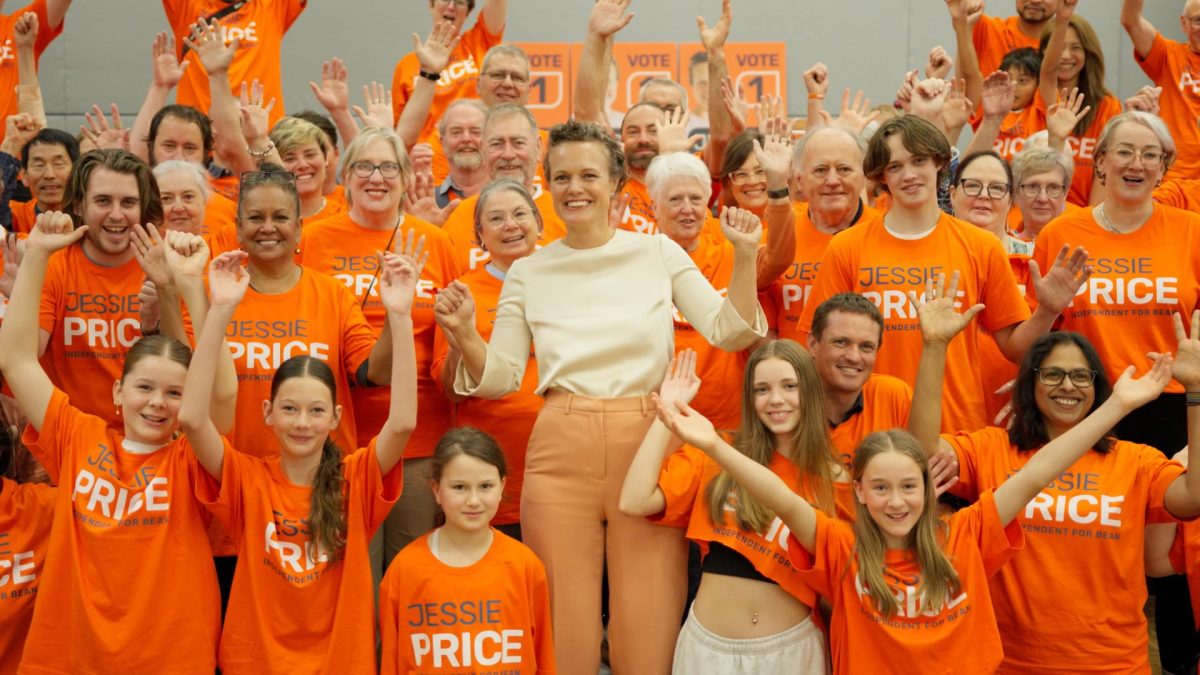
Independent Jessie Price and supporters. Photo: Voices for Bean.
Is the seat of Bean up for the taking as we head to next weekend’s federal election? Could it be Canberra’s bellwether, or is the conversation a storm in a media teacup?
There’s a sea of orange in southern streets as independent candidate Jessie Price mobilises ground forces. Liberal candidate David Lamerton is facing accusations of restarting the culture wars, while Greens candidate Sam Carter denies that his party is perceived as extremists.
And according to his opponents, sitting Labor Member of Parliament David Smith is nowhere to be seen, too comfortable in a safe seat.
It’s true that seats with substantial buffers are often a target for independents or minor parties, and there’s simmering discontent with long-standing Labor rule in the ACT. But as the ABC’s election analyst Antony Green says, at 12.9 per cent, Bean is “very safe” Labor territory.
There was little evidence of fire and brimstone on stage when four candidates joined an election debate convened by the Tuggeranong, Weston Creek and Woden community councils. The event was live-streamed, and questions came from the audience, viewers, and pre-submitted questions.
The range was wide: Alec queried the “white elephant/ financial scandal that is Light Rail Stage 2”, Michael probed Ms Price’s ability to produce concrete policy rather than slogans, Les pushed on Mr Smith’s Gaza stance and there were impassioned questions from the floor on Mr Lamerton’s willingness to make a commitment to LGBTQIA+ rights.
Local matters ranged from lighting for sports grounds to the proposed closure of the Burrangirri aged care respite centre – many of them primarily ACT Government issues rather than Federal.
The debate mood was largely constructive. Mr Lamerton implied some local media had framed him on the culture wars question. With former Senator Zed Seselja’s record in mind, he was asked if he’d consider voting against party lines on particular issues, including tax reform, gambling ads and truth in advertising.
“I’d have to address it on a case-by-case basis, but it’s always worth talking to the electorate and getting their views, and sometimes it will be a no-brainer”, he said.
He was also pressed several times on guaranteeing the rights of transgender people, and detailed concerns regarding medical interventions on gender for children under 18 and access to toilets.
Ms Price, a former journalist and midwife, had filled the audience with her supporters. “Community independents are totally connected and accountable to the community,” she said, promising to make a difference from the cross benches.
“It’s not a given it won’t be a minority government,” Ms Price said, citing progress in this term on the National Anti Corruption Commission. “The cross bench mechanism is judging all legislation on its merits, amending and breaking up legislation,” she said, noting that seats are reserved for independents on parliamentary committees.
Sam Carter is a two-time Paralympian and Commonwealth Games medallist, as well as a former ACT election candidate. He nominated the cost of living crisis as the major issue in the electorate.
“People are having a hard time paying the rent and putting food on their tables … in a wealthy country like ours, this needn’t be the way,” he said, characterising housing and affordable healthcare as issues where both major parties had failed ordinary Australians.
David Smith connected his values to public servant parents with a passion for social justice.
“A driver for me has been how I can progress those aims, not just across Bean, but across Australia”, he said.
“Labor doesn’t do things perfectly, but we’re driven by a desire to be a light on the hill to deliver collectively for the most vulnerable,” he said, adding, “there’s a significant difference to what you can deliver in opposition to government.”
Pressed on the housing crisis, Mr Smith referred to 700 affordable houses being built in Phillip, while Ms Price said that throwing money at housing would continue to drive up house prices, nominating an urgent need for tax reform and legislation that addresses structural issues, including construction costs and supply.
Mr Lamerton said Peter Dutton’s proposed 41,000 job reductions in the APS would be gradual.
“Already 34,000 people have left the APS nationwide under this Labor government through natural attrition. The shock and awe campaign in black and white terms is simply not the case,” he said, noting that recruitment freezes are in place under the current government.
Questions were asked on the US alliance and China, continued funding for the ABC, the dangers of Artificial Intelligence and infrastructure guarantees.
Price’s team believes she has momentum, and the Greens point to a strong record of electing candidates from the South to the Assembly. Lamerton has a traditionally conservative base in the valley, while Smith sits on a wide margin.
So, while there is sound and fury on the campaign trail, it’s not yet clear whether anything is being signified by it, as the electoral mood in general drifts back more closely to the incumbents.
With luck, in the end, democracy will be the winner.
Genevieve Jacobs is the CEO of Hands Across Canberra and chaired the Bean election debate on behalf of the Tuggeranong, Weston Creek and Woden Community Councils.
Original Article published by Genevieve Jacobs on Region Canberra.


